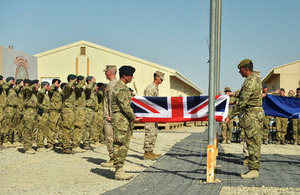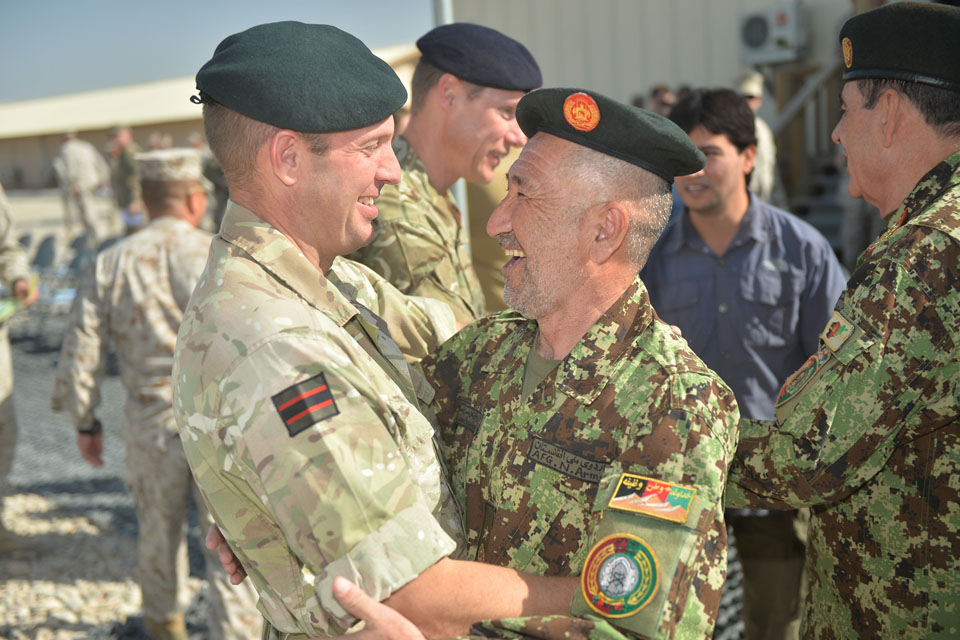UK ends combat operations in Helmand
UK Armed Forces end combat operations in Helmand, paving the way for the final transfer of security to the Afghan National Security Forces.

Union Flag lowered for the last time at Camp Bastion
As they have on the battlefield, British troops stood shoulder-to-shoulder with colleagues from the United States and Afghanistan to witness the Union Flag and Stars and Stripes lowered for the last time at the Bastion-Leatherneck complex.
The ceremony marks the end of operations for Regional Command (Southwest), a UK and US coalition command under the umbrella of NATO’s International Security Assistance Force (ISAF). Other contributing nations have included Denmark, Estonia, Georgia, Tonga, Jordan and Bosnia.
Secretary of State for Defence Michael Fallon said:
It is with pride that we announce the end of UK combat operations in Helmand, having given Afghanistan the best possible chance of a stable future. Our Armed Forces’ tremendous sacrifice laid the foundations for a strong Afghan Security Force, set the security context that enabled the first democratic transition of power in the country’s history, and stopped it being a launch pad for terrorist attacks in the UK.
Although we are ending a significant chapter in our shared history, the UK’s commitment to support Afghanistan will continue through institutional development, the Afghan National Army Officer Academy, and development aid.
The UK has had a military presence in Afghanistan since October 2001, when troops deployed as part of the NATO response to the 11 September 2001 terrorist attacks in the US.
Chief of the Defence Staff, General Sir Nick Houghton, said:
Over 13 years of operations in Afghanistan thousands of men and women from all of our Armed Forces have played a hugely significant role in delivering a security legacy for the people of Afghanistan. It has required remarkable moral courage, tenacity and innovation to achieve our objectives in the most testing environments.
In 2006 the British effort moved to Southern Afghanistan when Task Force Helmand was formed in April of that year to tackle a growing insurgency in the region.
British and allied efforts in Helmand set the security context for the development of the ANSF, with recent ISAF operations focussing on training and mentoring Afghan forces. In June 2013 the 330,000 strong ANSF took assumed lead responsibility for security across Afghanistan and since then they have been responsible for 99% of operations. Notable achievements have included planning and delivering the security for the successful Presidential elections in April this year during which seven million Afghans turned out to vote.

Brigadier Rob Thomson, Deputy Commander of Regional Command South West, embraces a senior Afghan official during the End of Operations Ceremony. [Picture: Crown copyright]
Brigadier Rob Thomson, Deputy Commander of RC (SW) and the senior UK officer in Helmand, said:
The formal end of UK combat operations in Afghanistan marks the final step in a deliberate, responsible and measured handover to the ANSF. They are more than ready to take on responsibility for security in Helmand. We can be extremely proud of the part we have played in building a capable, credible and confident Afghan force.
They have the baton, they are ready, and I am struck by their courage and commitment.
We have travelled some hard yards in Helmand alongside our coalition allies, and every single service and branch of the Armed Forces has been part of that effort. We will never forget the 453 soldiers, sailors and airmen who have made the ultimate sacrifice.
Updates to this page
-
Image text changed
-
Added recent image
-
First published.